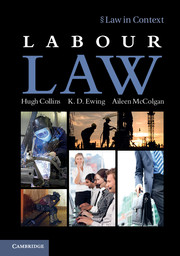Book contents
- Frontmatter
- Contents
- Preface
- Acknowledgments
- Table of cases
- Table of statutes
- Table of statutory instruments
- Table of European Union instruments
- Table of ILO instruments
- Table of other international instruments
- Abbreviations
- Part I Introduction
- Part II The contract of employment
- Part III Statutory regulation of the employment relationship
- 7 Wages
- 8 Working time
- 9 Equality
- 10 Work/life balance
- 11 Civil liberties at work
- Part IV Collective labour rights
- Part V Termination of employment
- Index
- References
7 - Wages
from Part III - Statutory regulation of the employment relationship
- Frontmatter
- Contents
- Preface
- Acknowledgments
- Table of cases
- Table of statutes
- Table of statutory instruments
- Table of European Union instruments
- Table of ILO instruments
- Table of other international instruments
- Abbreviations
- Part I Introduction
- Part II The contract of employment
- Part III Statutory regulation of the employment relationship
- 7 Wages
- 8 Working time
- 9 Equality
- 10 Work/life balance
- 11 Civil liberties at work
- Part IV Collective labour rights
- Part V Termination of employment
- Index
- References
Summary
The wage/work bargain
The legal construction of the core bargain of the contract of employment comprises the promise to perform work in return for a promise to pay wages. The terms of this agreement that fix the nature of the work to be performed and the rate of pay become the legally enforceable obligations. In the absence of such express mutual undertakings, there may be no contract at all for want of consideration. It is therefore sometimes said that the mutuality of obligation, namely, the promise to perform work in return for a promise to pay wages, is an essential element of the contract of employment.
Using the legal principle of freedom of contract, an employer can construct complex systems of payment for work. As well as a regular weekly or monthly salary, the employer may add fringe benefits, incentive payments such as bonuses and commissions, and longer term deferred payments such as pensions to encourage loyalty and discourage labour turnover. The amount payable may be varied according to the hours worked, such as shift systems designed to provide 24/7 services involving unsocial hours. In the illustrative specimen contract given in Chapter 3, the contract purports to provide a guaranteed minimum number of hours, which will lead to a basic weekly pay, but the calculation of the wages due each week depends on further details in an appendix (not supplied) about the shift system and overtime payments, and the guarantee of minimum hours is not absolute. The complexity of these payment systems may often give rise to difficult questions about the interpretation of the small print in the contract and its appendixes.
- Type
- Chapter
- Information
- Labour Law , pp. 229 - 265Publisher: Cambridge University PressPrint publication year: 2012



